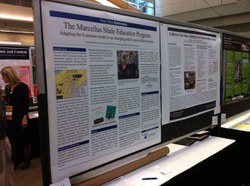
PITTSBURGH – Pennsylvania and Penn State recently hosted ‘Galaxy IV’, a conference for Extension professionals, at the David L. Lawrence Convention Center in Pittsburgh.
More than 3,500 extension educators and faculty from Land Grant Universities across the nation participated in the conference. During the event, the impact of shale gas development, and the extension’s role in this important public issue, was a frequent topic of discussion.
Day one of the conference featured a discussion and tour of shale gas development in Southwestern Pennsylvania and West Virginia.
West Virginia Extension Educators led the charter bus tour to Dallas, WV, where the group visited with a Consol Energy Compression Station and where a company representative explained the nature of their business in the area, the quality of the resource and their abilities to produce it safely.
He pointed out many of their best management practices to mitigate environmental impacts. Following the Consol Energy visit, the tour visited the Mark West Compressor Station near Majorsville. This facility is currently under a significant expansion and will be utilized to convey gas along the interstate pipeline system.
The conference featured research poster sessions with a number of posters focusing on shale energy. Penn State Marcellus Education Team members Mark Madden and Dave Messersmith presented a poster on ‘The Marcellus Shale Education Program: Adapting the Extension Model to an Emerging Public Issue in Pennsylvania.’
The poster outlined the variety of shale energy educational programs and resources developed at Penn State and highlighted recent international work by the team. Marcellus Shale and shale energy is a relatively new issue in Pennsylvania, but it potentially affects much of what extension’s traditional expertise addresses (land use, water quality and quantity, economic development, forest management, wildlife, family finances, public policy and local government). So even though shale energy is new, Penn State Extension is well-positioned to help citizens, businesses, local leaders, communities, and others understand what it means for Pennsylvania and how it may affect the environment, economy, communities, and citizens.
Educators from Ohio State presented a poster on their work with landowners in Ohio dealing with pipeline easements and other shale energy issues. Their work includes landowner workshops and publications on right of way negotiation, restoration and reseeding recommendations, and a landowner’s pipeline easement checklist.
There was also a research poster from Wyoming, where Extension Educators have developed a CDL driver training course. Parts of Wyoming have experienced a drain of qualified agricultural truck drivers as commercial drivers move to higher paying jobs in the oil shale fields in Montana and North Dakota. As illustrated by this example, the impact of shale energy development can often be far reaching.
The National Association of County Agricultural Agents honored Messersmith as a national communications award finalist for his Prezi on natural gas pipelines. Dave’s Prezi is a condensed version of the natural gas pipeline workshop that the extension has been delivering to landowners and public officials across the commonwealth for several years. The online presentation can be viewed here.
One of the highlights of the conference was a panel discussion on ‘Extension’s Role in Controversial Issues’ with representatives from both Penn State and Ohio State discussing approaches to delivering educational programs on shale energy. Major discussion points included maintaining objectivity, developing research on shale impacts and funding. The session was well attended and was followed by a healthy discussion and dialogue with presenters and peers.
The week’s activities and networking that occurred underscored the significance of shale resources nationwide and the efforts Extension professionals across the country are undertaking to help their local citizens understand the industry.